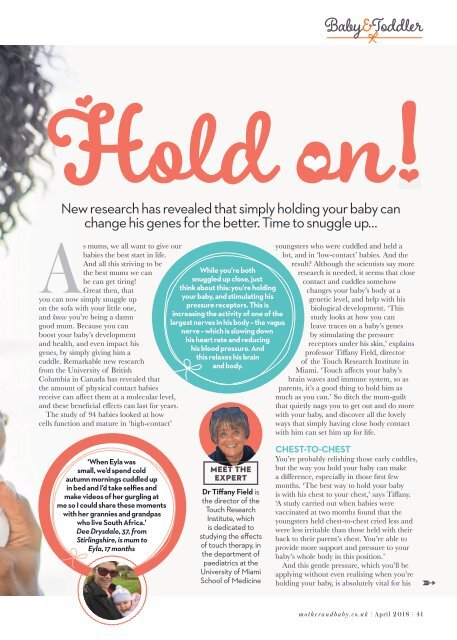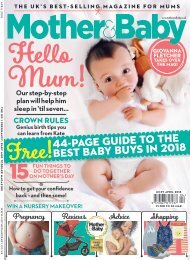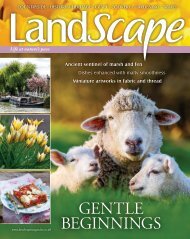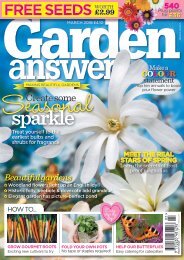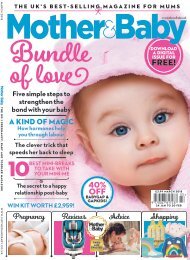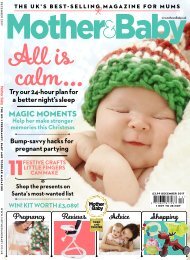You also want an ePaper? Increase the reach of your titles
YUMPU automatically turns print PDFs into web optimized ePapers that Google loves.
<strong>Baby</strong>&Toddler<br />
Hold on!<br />
New research has revealed that simply holding your baby can<br />
change his genes for the better. Time to snuggle up…<br />
As mums, we all want to give our<br />
babies the best start in life.<br />
And all this striving to be<br />
the best mums we can<br />
be can get tiring!<br />
Great then, that<br />
you can now simply snuggle up<br />
on the sofa with your little one,<br />
and know you’re being a damn<br />
good mum. Because you can<br />
boost your baby’s development<br />
and health, and even impact his<br />
genes, by simply giving him a<br />
cuddle. Remarkable new research<br />
from the University of British<br />
Columbia in Canada has revealed that<br />
the amount of physical contact babies<br />
receive can affect them at a molecular level,<br />
and these beneficial effects can last for years.<br />
The study of 94 babies looked at how<br />
cells function and mature in ‘high-contact’<br />
While you’re both<br />
snuggled up close, just<br />
think about this: you’re holding<br />
your baby, and stimulating his<br />
pressure receptors. This is<br />
increasing the activity of one of the<br />
largest nerves in his body – the vagus<br />
nerve – which is slowing down<br />
his heart rate and reducing<br />
his blood pressure. And<br />
this relaxes his brain<br />
and body.<br />
youngsters who were cuddled and held a<br />
lot, and in ‘low-contact’ babies. And the<br />
result? Although the scientists say more<br />
research is needed, it seems that close<br />
contact and cuddles somehow<br />
changes your baby’s body at a<br />
genetic level, and help with his<br />
biological development. ‘This<br />
study looks at how you can<br />
leave traces on a baby’s genes<br />
by stimulating the pressure<br />
receptors under his skin,’ explains<br />
professor Tiffany Field, director<br />
of the Touch Research Institute in<br />
Miami. ‘Touch affects your baby’s<br />
brain waves and immune system, so as<br />
parents, it’s a good thing to hold him as<br />
much as you can.’ So ditch the mum-guilt<br />
that quietly nags you to get out and do more<br />
with your baby, and discover all the lovely<br />
ways that simply having close body contact<br />
with him can set him up for life.<br />
‘When Eyla was<br />
small, we’d spend cold<br />
autumn mornings cuddled up<br />
in bed and I’d take selfies and<br />
make videos of her gurgling at<br />
me so I could share these moments<br />
with her grannies and grandpas<br />
who live South Africa.'<br />
Dee Drysdale, 37, from<br />
Stirlingshire, is mum to<br />
Eyla, 17 months<br />
MEET THE<br />
EXPERT<br />
Dr Tiffany Field is<br />
the director of the<br />
Touch Research<br />
Institute, which<br />
is dedicated to<br />
studying the effects<br />
of touch therapy, in<br />
the department of<br />
paediatrics at the<br />
University of Miami<br />
School of Medicine<br />
CHEST-TO-CHEST<br />
You’re probably relishing those early cuddles,<br />
but the way you hold your baby can make<br />
a difference, especially in those first few<br />
months. ‘The best way to hold your baby<br />
is with his chest to your chest,’ says Tiffany.<br />
‘A study carried out when babies were<br />
vaccinated at two months found that the<br />
youngsters held chest-to-chest cried less and<br />
were less irritable than those held with their<br />
back to their parent’s chest. You’re able to<br />
provide more support and pressure to your<br />
baby’s whole body in this position.’<br />
And this gentle pressure, which you’ll be<br />
applying without even realising when you’re<br />
holding your baby, is absolutely vital for his<br />
motherandbaby.co.uk | <strong>April</strong> 2018 | 41


